Chart of the week: 56% of salespeople and marketers say that their teams are siloed.
Siloed teams can cause a number of issues within an organization, including lack of communication and unaligned goals, which can have a broader impact. This is why it is fairly worrying that 56% of salespeople and marketers say that their teams are siloed.
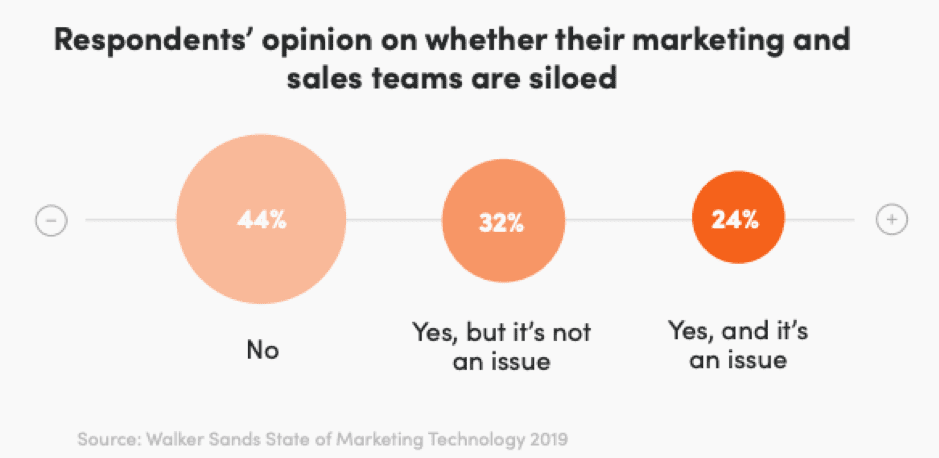
According to new research from Walker Sands, less than half (44%) of respondents say that their marketing and sales teams aren’t siloed. Almost a third 32% say they are but that it isn’t a problem, which may not be entirely accurate in the long-run or could be because they’ve grown used to the disconnect, while 24% say teams are siloed and it is a problem.
Siloed teams tend to occur when they report to different people. While this may not necessarily seem like an issue at first, both departments rely on each other, work to support the brand and generate leads. This means that differences in their strategies can result in the same company attempting to push two different messages, leading to confusion for consumers.
Making teams less siloed
When it comes to solving the disconnect between marketing and sales teams, which is only ever going to benefit a business, survey respondents believe that a change in culture is vital. Some 37% say that changing the culture of both departments is the main thing that can make the teams less siloed. A further 35% say that a culture change at the senior leadership level is required.
Changing the culture of the departments and leadership can help to encourage communication. Including members of both teams in meetings where decisions are being made, asking the opinion of the sales department when creating marketing content and vice-versa, and ensuring both teams are working to the same goals can help make positive changes.
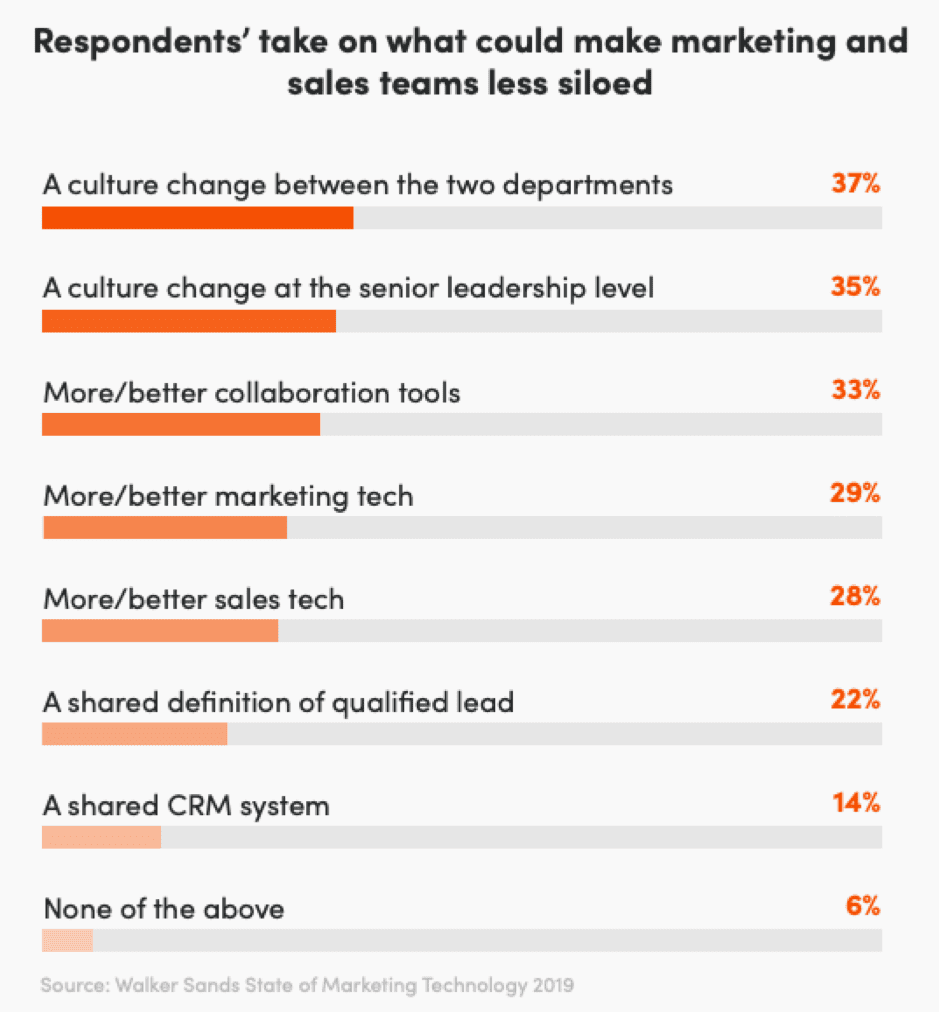
As well as a culture change, a third (33%) of respondents said that more or better collaboration tools would also be beneficial. Making it easier for teams to talk to each other and share relevant materials will help to encourage the culture change that many organizations require.
Only 6% said that none of the options provided in the survey would help to improve the disconnect between sales and marketing teams, which could suggest that some companies have very specific reasons for the siloed teams.
The threat of martech
While a lack of collaboration between sales and marketing teams are currently causing tensions, there are other concerns for marketers. According to the research, 42% of marketers now believe that martech will threaten their jobs at some point. This is an increase of 3% compared to 2018, which saw 39% believe the same thing. Of those who believe that martech could have an impact on job security, 32% agree while 10% strongly agree that this will be the case.
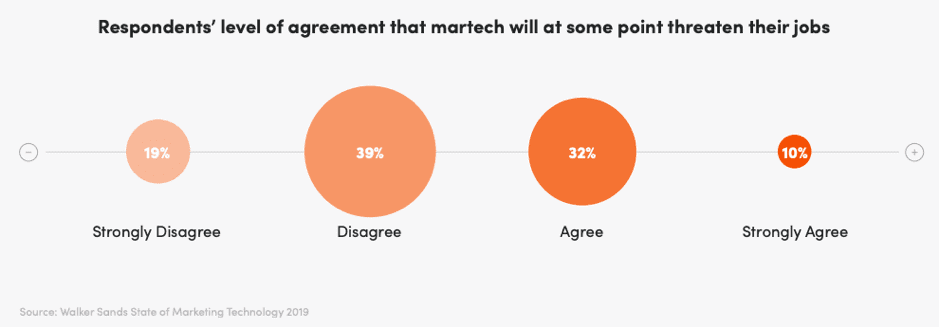
As technology, such as artificial intelligence, improves and becomes more common throughout marketing, many marketers are seeing the tech take on tasks that were previously performed by people. This suggests that leaders should be transparent about the technology they are bringing on board and how it will impact their overall marketing team, including any new opportunities.
Failing to deal with tensions like this can lead to a drop in engagement and staff happiness. Not only does this affect the work that is being done, but it can also ultimately mean that companies fail to retain talent as staff departure increases.
Martech is still a big player
A big reason that the threat of martech needs to be addressed by marketing leaders within a business is that the marketing industry is still seeing it as having a big influence. Marketers are continuing to see growth in martech, as more businesses take on solutions to better automate activity.
In fact, 40% of survey respondents believe that artificial intelligence is likely to be the biggest buzzword of 2019. As AI becomes easier to implement and offers a solution to the more mundane tasks that marketers face, its popularity is likely only to grow throughout the year.
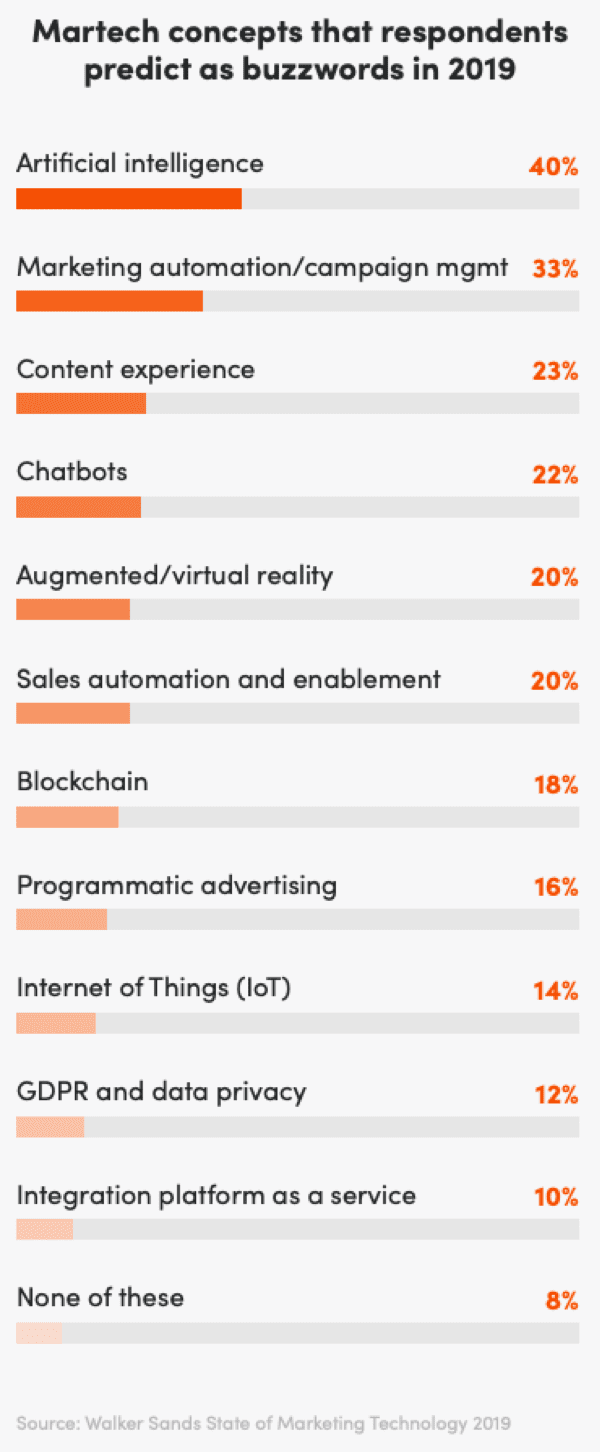
As well as AI, a third (33%) believe that marketing automation is likely to be a big buzzword in 2019, while 22% have cited chatbots as being important. Both of these forms of tech are often considered as extensions of AI, showing that this really is likely to be the technology to look out for.
While AI has some marketers worried about their job security, it is worth noting that this type of technology deals with the small and mundane tasks that would otherwise take up a lot of marketers’ time.
When bringing in AI to your organization, it is worth remembering that it will create more time for people in the marketing department, allowing them to make more strategic decisions and develop more effective campaigns. Highlighting these benefits to your team will help with transparency.
Other big buzzwords for the year ahead include content experience (23%), Augmented/virtual reality (20%) and sales automation and enablement (20%).
Is the buzz making a difference?
Although many types of martech are expected to be big buzzwords this year, not all organizations are planning on implementing them. Almost half (49%) have no current plans to implement AI into their marketing strategies, despite it being a trend for the year.
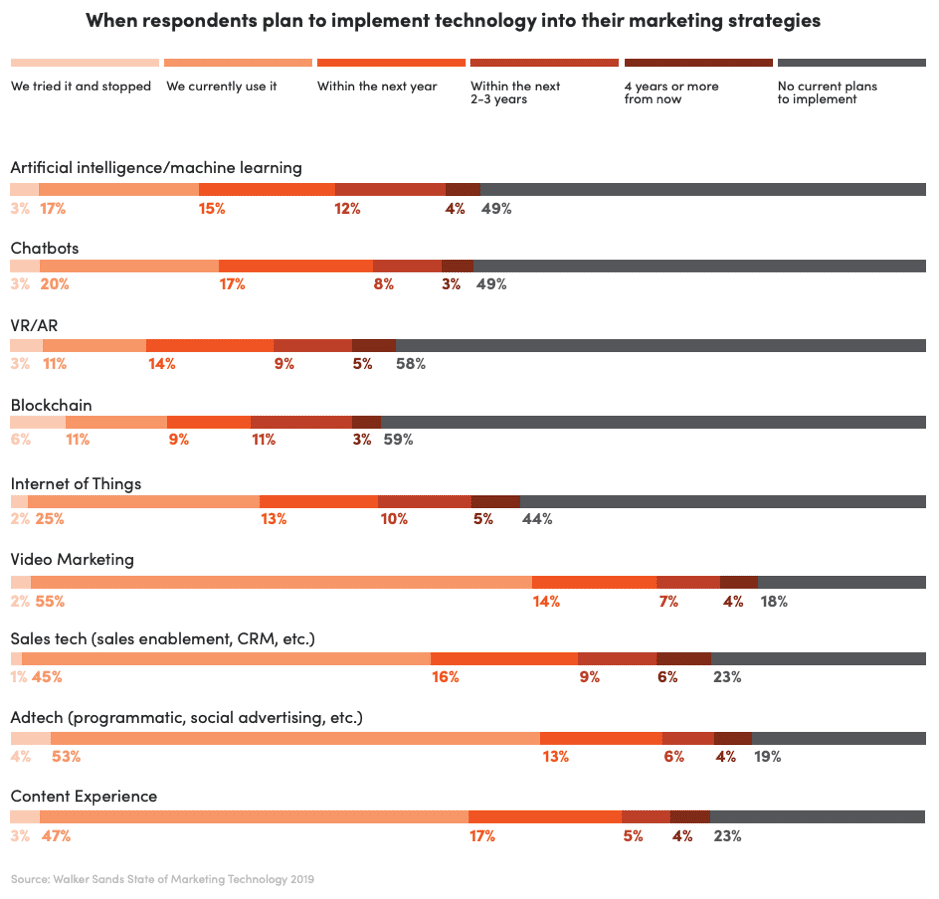
Just 17% are currently using AI, with 15% saying they plan on implementing it in the next year. Some 3% of respondents say they have used this tech previously but have now stopped, suggesting that not everyone sees the benefits of AI and automation.
Similarly, 49% of businesses have no plans to make use of chatbots, despite the increase in consumers wanting easier ways to contact companies and the rise in demand for personalized messages. However, more respondents are already using chatbots (20%) and a greater number (17%) are planning on implementing them within the next year. There is still 3% who have tried them but no longer utilize chatbots.
It also seems that more teams are already looking at ways they can better support each other in a bid to reduce the disconnect between sales and marketing. Currently, 45% of respondents are currently using sales technology, such as sales enablement and CRM, with 16% planning on implementing it within the next 12 months. While some technology may be causing tension, implementing the right solutions can help address team divides.
Final thoughts
Siloed sales and marketing teams are an ongoing issue that many organizations have failed to address. The fact that so many respondents say the teams are siloed but that it isn’t a problem suggests that this disconnect is so ingrained in the culture of the company that it is no longer viewed as an issue. This in itself is a problem, as it means that the larger company is failing to see the benefits of bringing teams together.
One of the big factors with this and other tensions seems to be a lack of communication. Teams not communicating results in issues, as does marketing leaders not communicating about what martech means for marketers.
While certain technology may help make lives easier for both sales and marketing, failing to inform teams as to how it will change their jobs can lead to a lack of understanding and feeling of job insecurity. Taking steps to improve communication and teamwork can reduce this and help you retain talent, as well as better help marketers to develop skills within the organization so you can retain talent.
Assessing what martech could help with overall business activities, as well as improve joint team performance, rather than just implementing the tech that everyone is talking about, will always be the best option.
